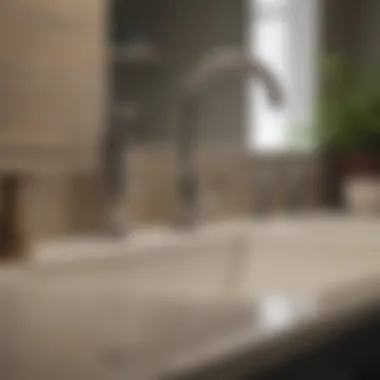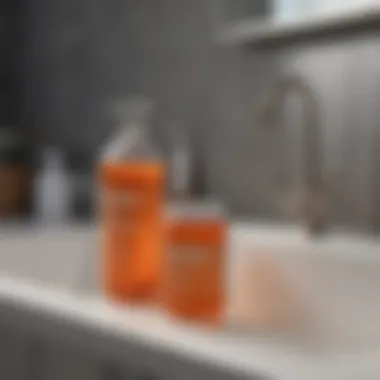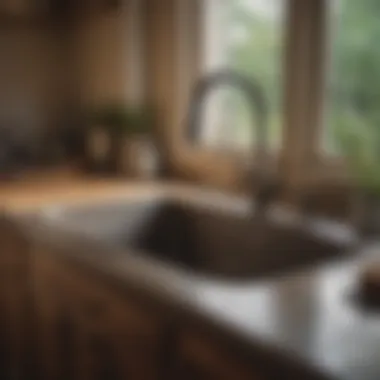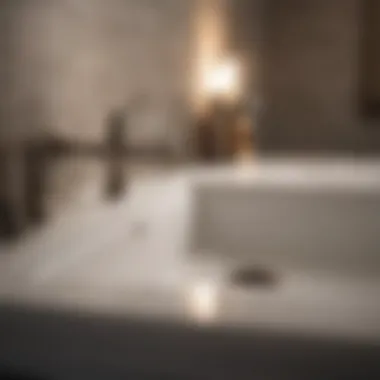Prevent Sink Backups with These Homeowner Tips for Smooth Plumbing


Battling sink backups in homes can be a tedious task, often causing inconvenience and disrupting daily routines. This comprehensive guide aims to equip homeowners with the knowledge and strategies to prevent and address sink backups effectively. By understanding the common causes behind plumbing issues and implementing practical solutions, individuals can maintain a smooth-flowing plumbing system within their household.
Inspiring Homes
In the realm of homeownership, maintaining a functional plumbing system is paramount to the overall well-being of the property. Sink backups can stem from various factors, ranging from food debris accumulation to grease build-up and even inadequate drainage systems. Addressing these issues promptly is crucial to prevent extensive damage and costly repairs in the long run.
Luxury Properties
While luxurious mansions and villas may boast extravagant features and opulent designs, even the most high-end residences are not immune to plumbing issues like sink backups. In these upscale settings, ensuring regular maintenance and proactive measures can help safeguard against unexpected disruptions and maintain the pristine allure of these properties.
Cozy Retreats
On the contrasting end of the spectrum, charming cottages and rustic cabins exude a different kind of charm and coziness. However, the charm can quickly fade if sink backups occur frequently. By incorporating effective preventive strategies and timely interventions, homeowners of such retreats can preserve the quaint ambiance while ensuring functional plumbing systems.
Unique Architectural Styles
Innovative architectural designs often push boundaries and captivate the imagination. Yet, these marvels of creativity can also pose unique challenges in terms of plumbing maintenance. Highlighting how different design concepts may affect plumbing systems can provide valuable insights for homeowners residing in architecturally remarkable properties.
Stay tuned for further sections unveiling practical tips and insights on preventing sink backups in homes.
Introduction
In the realm of homeownership, ensuring the proper functionality of plumbing systems is paramount. Within this comprehensive guide, we delve into the intricate world of preventing sink backups. This essential topic not only safeguards the smooth operation of your plumbing but also averts potential costly repairs and disruptions to your daily life. By understanding the underlying causes of sink backups and their repercussions on the plumbing system, homeowners can proactively address issues before they escalate.
Understanding the Issue


Causes of Sink Backups
Sink backups can stem from a variety of sources, such as food waste accumulation, grease buildup, and clogged garbage disposals. These culprits contribute to blockages in the pipes, leading to water not draining properly. Identifying these root causes is crucial in maintaining an efficient plumbing system. For instance, grease buildup can solidify over time, obstructing the free flow of water and causing backups. Despite its common occurrence, with proper precautionary measures, grease buildup can be effectively managed. Understanding the nuances of each cause equips homeowners with the knowledge needed to tackle these issues head-on.
Impact on Plumbing System
The impact of sink backups on the plumbing system can be widespread and severe if left unchecked. Not only do they impede the normal functioning of sinks, but they can also lead to issues in connected plumbing fixtures and even affect water quality. When water backs up, it can create pressure within the pipes, potentially causing leaks or bursts. Such scenarios can result in water damage to your property and necessitate costly repairs. Recognizing the repercussions of sink backups underscores the importance of timely intervention and maintenance.
Identifying Common Causes
Understanding the common causes of sink backups is crucial for homeowners to maintain a smooth plumbing system. By identifying these issues early on, individuals can prevent costly plumbing repairs and disruptions to daily routines. Common causes such as food waste accumulation, hair and soap residues, and clogged garbage disposals can lead to blockages and backups within the plumbing system. Recognizing these culprits and taking proactive measures is key to ensuring a functional and efficient plumbing setup in your home.
Food Waste Accumulation
Grease Buildup
Grease buildup is a significant concern in sink backups, as it can congeal within pipes, causing obstructions and reducing water flow. The viscous nature of grease makes it adhere to pipe walls, creating a buildup over time. This accumulation can trap food particles and other debris, exacerbating blockages in the plumbing system. Regularly disposing of grease in designated containers and avoiding pouring it down the sink can help prevent this issue. Implementing proper disposal practices and using sink strainers to catch grease before it enters the drain are effective preventive measures.
Food Particles
Food particles being washed down the sink can contribute to blockages, particularly when combined with grease residue. These particles can accumulate in pipes, creating a sludgy mass that impedes water flow. Ensuring that plates are scraped clean before dishwashing and using a sink strainer to catch food remnants can help prevent this issue. Regularly cleaning the sink drain with a mixture of baking soda and vinegar can also help break down food particles and maintain optimal drainage.
Clogged Garbage Disposal
A clogged garbage disposal can lead to sink backups, as food waste is not properly ground and flushed down the drain. Inefficient disposal systems can result in food jams and blockages within the pipes, causing water to back up into the sink. Avoid overloading the garbage disposal and refrain from disposing of hard items such as bones or coffee grounds, which can dull the blades and impede proper operation. Engaging in proper maintenance practices, such as running cold water while using the disposal, can help prevent clogs and backups.


Hair and Soap Residues
Hair and soap residues are common culprits in sink backups, particularly in bathroom sinks and showers. Hair can easily become tangled within drain pipes, creating blockages that impede water flow. Additionally, soaps containing fats and oils can solidify in pipes, contributing to clogs over time. Implementing preventive measures such as using drain covers to catch hair and residue, and opting for drain-friendly soaps that do not contain harsh chemicals can help mitigate these issues. Regularly flushing drains with boiling water can also help dissolve soap scum and prevent buildup within the plumbing system. By addressing these common causes effectively, homeowners can maintain a healthy and efficient plumbing system in their properties.
Maintenance Tips
In the realm of household maintenance, one cannot underestimate the significance of aptly timed and efficacious maintenance practices. Specifically in the domain of sink backups, a proactive approach towards maintenance holds the key to precluding potential plumbing catastrophes. In this comprehensive guide aimed towards homeowners keen on preserving the integrity of their plumbing systems, the section on Maintenance Tips emerges as a cornerstone of information dissemination and practical guidance. The essence here lies in the meticulous execution of regular upkeep routines, translating into prolonged functionality of household plumbing fixtures and a significant reduction in the occurrence of sink backups. Hence, adhering to a structured maintenance regimen is not just a suggestive tip but a critical imperative for ensuring the smooth operationality of sinks and drains in any home setting.
Regular Cleaning Practices
Using Baking Soda and Vinegar
When delving into the realm of regular cleaning practices for averting sink backups, the method of employing baking soda and vinegar surfaces as a time-tested and reliable solution. This dynamic duo, with their innate cleaning and sanitizing properties, symbolizes a natural and eco-friendly approach towards maintaining optimal sink functionality. The bubbling reaction created by the combination of these two household staples works wonders in dislodging debris, unclogging minor blockages, and eliminating foul odors from sink drains. The sheer simplicity and cost-effectiveness of utilizing baking soda and vinegar in regular cleaning routines not only render them accessible and practical but also denote them as a popular choice for meticulous homeowners striving to uphold the hygiene and efficiency of their plumbing systems. Embracing this methodology not only ensures a clean and odor-free sink but also portrays a sustainable and safe cleaning alternative in testament to the efficacy of natural cleaning agents within the household sphere.
Boiling Water Flush
Complementing the use of baking soda and vinegar, the practice of implementing a boiling water flush emerges as a supplementary yet indispensable step in the realm of sink maintenance. The application of boiling water serves as a robust and simple technique for dislodging and dissolving accumulated grease, soap scum, and other residues within the confines of sink drains. Its scalding temperature aids in melting fatty deposits and promoting their unobstructed flow through the plumbing system, thereby preventing the formation of stubborn blockages that act as precursors to potential sink backups. As an affordable, chemical-free, and easily executable measure, the boiling water flush stands out as a preferred choice for homeowners seeking to maintain the unimpeded functionality of their sink fixtures through a natural and minimally invasive cleaning strategy.
Avoiding Harmful Practices
Delving deeper into the realm of sink maintenance unveils the consequential narrative surrounding the avoidance of harmful practices that can inadvertently exacerbate plumbing issues. Within the gamut of household maintenance, steering clear of detrimental actions plays a pivotal role in safeguarding the structural integrity of sink drains and plumbing conduits. The essence here encompasses a conscious effort towards rectifying detrimental behaviors and replacing them with sustainable alternatives to safeguard the longevity of plumbing infrastructure within residential habitats.
Issues with Chemical Drain Cleaners
Highlighting the adverse impact of chemical drain cleaners on the overall health of sink drains and plumbing mechanisms reveals a concerning aspect of detrimental maintenance practices. The corrosive nature of these commercial cleaners not only deteriorates the structural integrity of pipes but also poses a hazard to the immediate environment and the individual responsible for their application. Contrary to popular belief, the seemingly quick fix provided by chemical drain cleaners often escalates the underlying issues within plumbing systems, resulting in exacerbated clogs, pipe erosion, and environmental pollution. Hence, the cessation of chemical drain cleaner usage emerges as a prudent and eco-conscious choice for homeowners intent on upholding the longevity and functionality of their sink fixtures without compromising the structural integrity of their plumbing setups.


Proper Disposal of Grease
Within the realm of preventing sink backups lies the pivotal practice of implementing proper disposal methods for grease residues generated during culinary endeavors. The proper disposal of grease stands as a cardinal rule in maintaining sink drains and sewer lines devoid of fats that solidify and obstruct the smooth flow of wastewater. By embracing conscientious disposal practices such as depositing cooled grease into designated receptacles or recycling facilities, homeowners can effectively mitigate the risk of grease-related blockages and subsequent sink backups. This proactive stance towards grease management not only fosters a cleaner and more efficient plumbing system but also delineates a sustainability-oriented approach towards household maintenance characterized by responsible waste disposal practices and a commitment to preserving plumbing infrastructure for prolonged utilization.
Seeking Professional Assistance
In the realm of home maintenance, seeking professional assistance for sink backups plays a pivotal role in ensuring the optimal functioning of your plumbing system. Professional plumbers bring a wealth of expertise and specialized knowledge to tackle complex issues that may arise beyond everyday DIY solutions. While understanding the root causes and basic remedies is essential, there are instances where only trained professionals can identify and address underlying issues effectively. By enlisting the services of a plumber, homeowners can benefit from precise diagnostics, targeted solutions, and long-term preventive measures tailored to their specific plumbing setup. Moreover, professional assistance adds a layer of assurance, giving homeowners peace of mind knowing that their plumbing concerns are being handled adeptly by skilled hands.
When to Call a Plumber
Persistent Backups
Persistent backups are a red flag in any plumbing system, indicating recurring issues that necessitate immediate attention. These backups, characterized by a continual regurgitation of waste or water in sinks, signal a more profound problem within the pipes or drainage system. Calling a plumber when facing persistent backups is crucial to prevent further damage to the plumbing infrastructure and to address the underlying cause effectively. Professional plumbers can conduct thorough inspections, use specialized tools to identify blockages or pipe damage, and implement targeted solutions to restore proper drainage flow. Beneficially, engaging a plumber for persistent backups ensures a comprehensive resolution, safeguarding against future disruptions and maintaining a healthy plumbing system.
Unusual Gurgling Sounds
Unusual gurgling sounds emanating from your sinks are not merely auditory nuisances but potential indicators of underlying plumbing issues. These sounds, often accompanied by slow drainage or water backups, can point to obstructions or improper ventilation in the plumbing network. Calling a plumber upon hearing unusual gurgling sounds is wise, as it signifies a need for professional intervention to assess and rectify the issue promptly. Professional plumbers are equipped to diagnose the source of the sounds, whether caused by air trapped in the pipes, blockages, or ventilation problems, and prescribe suitable remedies. Addressing unusual gurgling sounds with professional assistance ensures that any potential drainage issues are resolved expediently, preserving the efficiency and integrity of your home's plumbing system.
Conclusion
In the grand scheme of maintaining a functional plumbing system, the conclusion stands as the cornerstone ensuring sustained plumbing health for homeowners. By implementing preventive measures and conducting regular inspections, individuals can safeguard their homes against the inconvenience and expense of sink backups. It is crucial to understand that proactively addressing potential issues can prevent major plumbing emergencies down the line, saving both time and money. Emphasizing the significance of a well-maintained plumbing system cannot be overstated, as it contributes to a harmonious living environment free from plumbing disruptions.
Ensuring Sustained Plumbing Health
Implementing Preventive Measures
One of the fundamental aspects of upholding sustained plumbing health involves implementing preventive measures. This proactive approach involves adopting practices such as regular cleaning with baking soda and vinegar, as well as ensuring proper disposal of grease to prevent clogs in the sink. By integrating these preventive strategies into routine maintenance, homeowners can significantly reduce the likelihood of encountering sink backups. The key characteristic of implementing preventive measures is its preemptive nature, tackling potential issues before they escalate into full-blown plumbing disasters. While these methods may require minimal effort, the long-term benefits of preventing costly repairs and inconveniences make them a practical and popular choice for homeowners seeking to maintain an efficient plumbing system.
Regular Inspection
Regular inspection plays a vital role in sustaining plumbing health by allowing homeowners to identify and address underlying problems before they escalate. A key characteristic of regular inspections is their ability to detect minor issues such as leaks or blockages, preventing them from evolving into major plumbing concerns. This proactive approach empowers individuals to take control of their plumbing system's health, promoting longevity and functionality. While the unique feature of regular inspections lies in their ability to provide early intervention, thereby minimizing the risk of extensive damage, it is essential to recognize that neglecting this practice could lead to more significant problems in the future. By embracing regular inspections as a proactive maintenance strategy, homeowners can ensure the smooth operation of their plumbing system and mitigate the risk of unexpected breakdowns.



